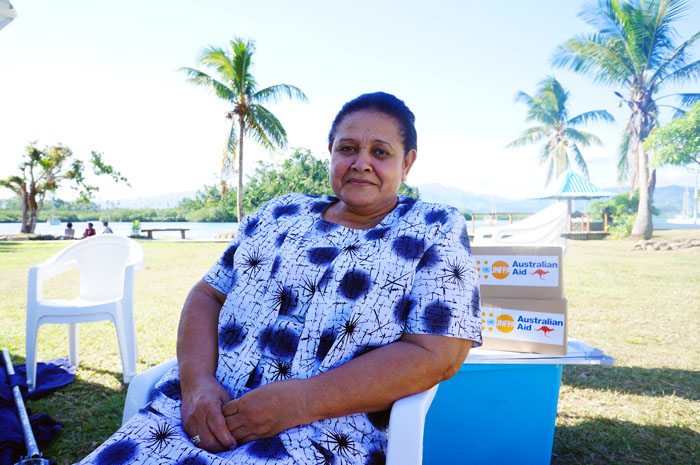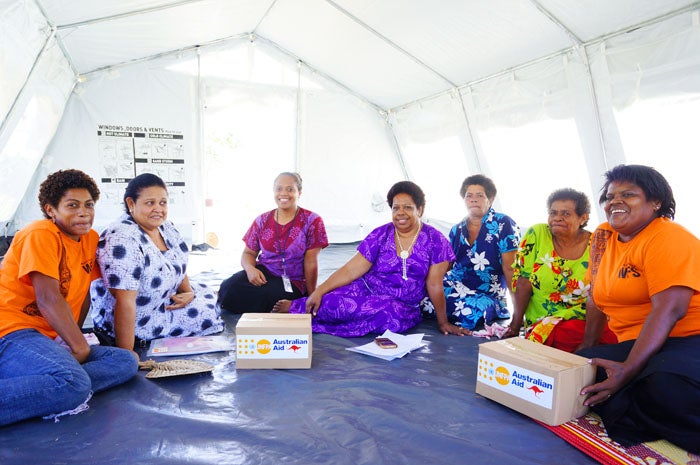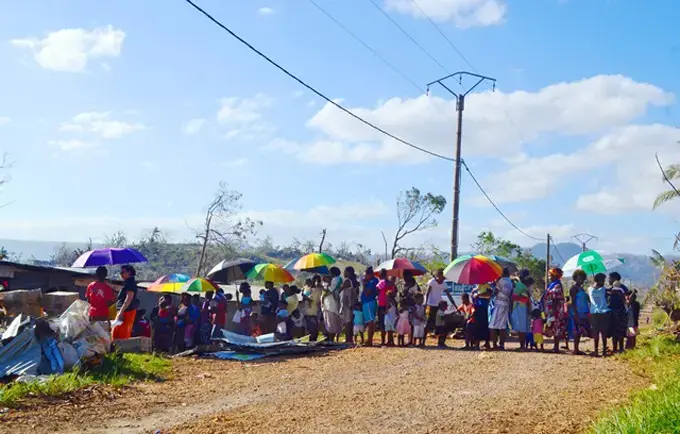Phyllis Hazelman is a 60-year-old retired human resources professional whose innate love for working with people mean that retirement is merely a term: as an individual, community work in her Nukubalavu area was an extension of sorts of her professional life.
Ms Hazelman was going about her Savusavu retirement life when she heard that a women friendly space (WFS) was to be established in central Savusavu. "It was the women friendly space that got me - just that phrase," she recounted at the WFS which was set up behind the market.

In the wake of Severe Tropical Cyclone Winston, the United Nations Population Fund (UNFPA) supported the establishment of eight women friendly spaces in the worst-hit areas working with the Ministry of Health and Medical Services, Ministry of Women, Children and Poverty Alleviation and non-government organisations Empower Pacific and the Fiji Women's Crisis Centre.
UNFPA was able to re-engage retired midwives to be part of the WFS and the mobile medical team outreach program to hard-to-reach areas, to ensure sexual and reproductive health services reached those who could not, for whatever reason, reach medical facilities and/or were only able to come to the WFS.
"It has been a wonderful experience to be involved in something that offered a space only for women and young girls, where they could gather and discuss things without intimidation. The ways information sessions were organised, it was a very good exercise," Ms Hazelman said.
Within 78 hours of TC Winston leaving portions of the country in devastation, UNFPA was able to include 200 dignity kits in the first vessel to go to Koro, one of the 300 islands of the Fiji Group which was flattened, its people left with nothing more than the clothes on their back.
Prepositioned dignity kits and emergency delivery kits with the support of Australia was the immediate response from UNFPA. Longer-term activities included the WFSs and the outreach missions by mobile medical teams.
The main objective of the GBV response is to facilitate mechanisms or implement measures which could prevent gender-based violence in fragile settings for example during an emergency response - core to this intention is a multi-sectoral approach.
WFS is one of the main humanitarian-related activities UNFPA implements globally; this was the first time it was rolled out in Fiji, but the second in the Pacific region having implemented the same program after Cyclone Pam in Vanuatu (last year).
Community facilitators were recruited through the Ministry of Women, Children and Poverty Alleviation; the women would have already had experience in community work, and were from the communities around the WFS.
All WFS community facilitators participated in a three-day orientation which covered topics around gender and gender-based violence, referral mechanisms and their roles and functions.
As one of the community facilitators, Ms Hazelman said the response was effective because it actually met a need at community level particularly in terms of awareness of health-related issues.
"We dedicated Saturdays to adolescent girls because it was not a school day and some of them are only allowed into town then so the information shared by the midwife was very much appreciated," Ms Hazelman said.
"I got feedback from a lot of parents who were glad issues which may be difficult to discuss openly at home was being addressed in a safe space and with people who were trained to facilitate such discussions."
Midwife, Sister Moapa Nainima who retired in 2015 said men and boys were not left out completely although the WFS remained strictly a space for women and girls.
"Our husbands were also very supportive of what we were involved in; I must thank the community facilitators, they were incredible in their determination to make the concept work," Ms Nainima said.
"It was wonderful to be part of a project that allowed us to sit down with women who started sharing their experiences with us once they got comfortable, expressing how they felt about these things and when we had to, we knew the referral system."
A fundamental in community nursing is the profiling exercise of people in the area they work in; the exercise allows them to determine trends if there are any, be informed by communities themselves what they felt were the priority needs, etc.
For the WFS exercise, having community facilitators from the surrounding communities was therefore a critical factor in the quick and successful profiling before the roll-out of the WFS.
The Savusavu WFS covered a total population of 3600 in 596 homes.
Rosalina Mojica, 67, is another community facilitator from Yarrow, just outside Savusavu. For her, the experience was also very much of personal significance.
"Just being here has been a huge learning curve for me. I am also able to speak on these issues at home more confidently - I think we should have these centres all the time after disasters, it is something that will really help women and girls," Ms Mojica said.
For the UNFPA, this week marks the final week of the WFS which remain open, the three in Ba.
"For the UNFPA as a whole, introducing and implementing the concept of the women friendly space working with local partners, the Government and civil society, has been an excellent example of effective approaches because they are targeted," Dr Laurent Zessler, UNFPA Pacific Director and Representative, said.
"This week marks the end of this particular response and we are indebted to our partners, the Government of Fiji and civil society members who came to the table with their expertise, and helped make the concept work.
"UNFPA is also very grateful to midwives who came forward and agreed to go through some real hardships just so they were able to be present at community level to help populations; their courage in crossing rivers to reach villages and sleeping in tents for the people, is highly commended."




